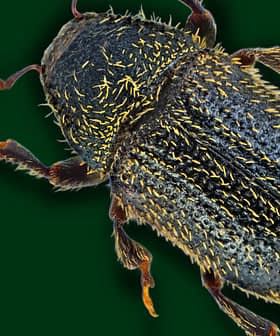Adherence to Mediterranean Diet Alleviates PTSD Symptoms, Study Suggests

A study published in Nature Mental Health found a connection between adherence to a Mediterranean diet and a reduction in PTSD symptoms. The study, conducted by researchers from Brigham and Women’s Hospital and the Harvard T.H. Chan School of Public Health, highlighted the potential benefits of dietary recommendations for PTSD prevention or amelioration by exploring the relationship between diet, the gut microbiome, and PTSD symptoms.
A study conducted by researchers from Brigham and Women’s Hospital and the Harvard T.H. Chan School of Public Health has shed new light on the intricate relationship between post-traumatic stress disorder (PTSD), dietary patterns and the gut microbiome.
The study, published in Nature Mental Health, uncovered a notable connection between adherence to a Mediterranean diet and a reduction in PTSD symptoms.
While further research is needed, we are closer to being able to provide dietary recommendations for PTSD prevention or amelioration.
PTSD is a fear-based mental health condition that can develop in individuals exposed to distressing and traumatic situations, including severe injury, the threat of death or acts of violence.
Individuals who have PTSD not only contend with its immediate psychological effects but also face an increased risk of chronic health conditions such as coronary heart disease, stroke, diabetes, autoimmune disorders and even premature death.
See Also:Health NewsRecognizing the role of diet and the gut microbiome in the context of PTSD has the potential to yield recommendations and outcomes that benefit those affected by the disorder.
Co-author Yang-Yu Liu, from the Channing Division of Network Medicine at Brigham and Women’s Hospital, highlighted the intriguing relationship between the human gut microbiome and the brain.
“Through our study, we examined how factors like diet are associated with PTSD symptoms,” she said. “While further research is needed, we are closer to being able to provide dietary recommendations for PTSD prevention or amelioration.”
The human gut microbiome is an active hub of metabolic activity. Within the colon, bacteria play a pivotal role in fermenting and digesting various components, including carbohydrates, protein and lipids from the host and the diet. These processes generate metabolites that can have either beneficial or detrimental effects on health.
For example, the fermentation of carbohydrates produces short-chain fatty acids, mainly acetate, propionate, and butyrate.
These compounds offer numerous health benefits, such as providing energy for colon cells, enhancing ion absorption, possessing anti-inflammatory properties and regulating serotonin production while influencing the number of enterochromaffin cells.
Remarkably, butyrate has exhibited antidepressant-like effects in mice, surpassing the effects of fluoxetine, a common ingredient in many antidepressants.
Furthermore, commensal bacteria can produce neurotransmitters with neuroactive properties, including GABA, serotonin and dopamine. These neurotransmitters cannot cross the blood-brain barrier but may stimulate intestinal epithelial cells to release molecules that, in turn, modulate neural signaling. This complex interplay can influence brain functions and behavior.
Although extensive research has highlighted the gut microbiome’s influence on emotional development and response, the link between the microbiome and post-traumatic stress disorder was largely unexplored.
The researchers underscored the significance of exploring the gut-brain axis, as it provides insights into the interdependence of mental and physical health.
Their findings suggest that the relationship between PTSD and the human gut microbiome presents a promising avenue for research, offering the potential for recommendations to alleviate the downstream negative health consequences of PTSD.
See Also:Mediterranean Diet Changes Gut Microbiome, Improves Health in SeniorsTo investigate this relationship, the team collected data from 191 participants in sub-studies of the Nurses’ Health Study-II, which encompassed the Mind-Body Study and the PTSD sub-study.
Participants were categorized into three groups: those with probable PTSD, those who had experienced trauma without developing PTSD and those with no history of trauma exposure.
Each participant provided two sets of four stool samples: one at the study’s commencement and another six months later. This approach enabled the collection of microbial DNA data and confirmation of the stability of each participant’s gut microbiome throughout the six months.
The researchers then analyzed the associations between the microbiome’s overall structure and various host factors. These factors included PTSD symptoms, age, body mass index (BMI), and dietary information.
Through this evaluation, the researchers identified several host factors linked to the microbiome structure, such as BMI, depression and the use of antidepressants.
Subsequently, the team explored the connection between available dietary information and PTSD symptoms. Their findings revealed that participants adhering to a Mediterranean diet experienced fewer PTSD symptoms.
Notably, the consumption of red and processed meats, mostly absent from the Mediterranean diet, exhibited a positive association with the severity of PTSD symptoms. In contrast, the consumption of plant-based foods negatively correlated with these symptoms.
The researchers examined the link between PTSD symptoms and gut microbiome signatures to identify potential species that could protect against PTSD. Eubacterium eligens emerged as the most likely protective species for the disorder.
They concluded that E. eligens was positively associated with components of the Mediterranean diet, such as vegetables, fruits, and fish while displaying a negative association with red and processed meat consumption. E. eligens has previously been linked to nut consumption and vegetarian diets.
While the study offers valuable insights, the authors acknowledge certain limitations, such as the use of a short screening scale for PTSD instead of a formal clinical diagnosis. Nevertheless, the results provide a foundation for future research endeavors.
These include investigations into other mental health disorders and dietary interventions, intending to enhance recommendations for alleviating or preventing symptoms associated with these conditions.









